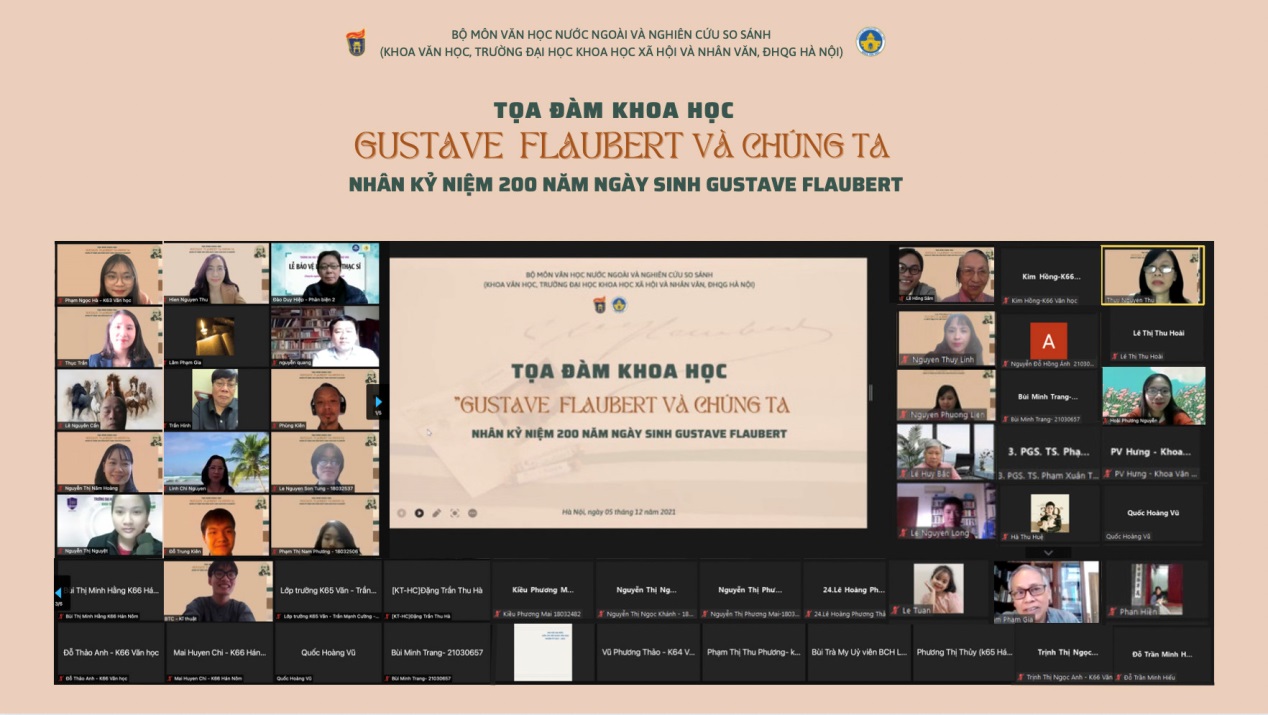Gustave Flaubert (1821-1880) was one of the most prominent authors of French literature in the latter half of the 19th century. Along with Stendhal and Balzac, Flaubert contributed to the century of novelists. In Vietnam, Flaubert's most important works have been translated into Vietnamese, including Madame Bovary, Salammbo, Three Tales, and most recently, the translation of *Education of the Sentiments* by Ms. Le Hong Sam, which has just been released to readers.
The online seminar "Gustave Flauber and Us" is a scientific activity organized by the Department of Foreign Literature and Comparative Studies to commemorate the 200th anniversary of the writer's birth.

Opening the seminar, Associate Professor Pham Xuan Thach, Head of the Faculty of Literature, Hanoi University of Social Sciences and Humanities, stated: “Flaubert was not only a national figure, but also a giant who created the humanistic heritage of humanity. Our scientific activities today show that: despite the pandemic, difficulties, and challenges, the heritage of humanity remains an important part of our lives.”
This special seminar fostered connection and sharing among generations of lecturers from the University of Social Sciences and Humanities, Hanoi Pedagogical University, and the Institute of Literature. In the first part of the event, researchers placed Flaubert within French literature, discussing the modernity in Flaubert's works, the writing techniques that created that modernity, and interpreting Flaubert through literary and cinematic language.
In her opening remarks, Ms. Le Hong Sam, lecturer in the Department of Foreign Literature and Comparative Studies, stated: “Flaubert both continued the tradition of the Balzac-style novel and concluded it. Therefore, Flaubert's works in general, and 'Education of the Sentiment' in particular, are not only considered great literary works but also valuable historical documents. Especially, 'Education of the Sentiment' raised issues of artistic style that novels of the 20th century and subsequent periods would continue to address.” Speaking about Flaubert's works, Ms. Le Hong Sam emphasized the writer's artistic skill, noting that every word and every small detail hints at significant issues.

Ms. Le Hong Sam speaks at the seminar.
Identifying G. Flaubert's position in French literature, Associate Professor Dr. Le Nguyen Can placed him within the broader context of the 19th century, alongside the historical novels of A. Vigny and P. Mérimée, the realist novels of Stendhal and Balzac, and the romantic novels of A. Dumas and George Sand. At the seminar, analyzing Flaubert's influence and the modernity of his works, Associate Professor Dr. Dao Duy Hiep emphasized Flaubert's prophetic role in modern novels, from poetic issues to ideological ones. The story of "the world of objects invading human life" remains highly relevant today. The modernity in Flaubert's works is clearly demonstrated in his artistic style. This was analyzed by Associate Professor Dr. Phung Ngoc Kien through a comparison of the differences between Flaubert's realism and Balzac's realism. Reading and interpreting Flaubert through the language of cinema, Professor Tran Hinh analyzed the adaptations of the novel Madame Bovary. According to Professor Tran Hinh, whether directors choose a faithful adaptation or a creative interpretation, they all create lasting vitality and a wide-ranging influence for Flaubert's work.

In the following section, the researchers presented analyses and insights into Flaubert's presence in various literary traditions, including Russian, American, Chinese, Indian, and Japanese literature.
From a Russian literary perspective, Dr. Nguyen Thi Thu Thuy analyzes the process of translating and receiving Flaubert in Russia, particularly the literary friendship between the Russian writer Turgenev and the French writer Flaubert. According to her, while in the initial period, Russians approached Flaubert's works from a realist perspective, in the second phase, with the development of symbolism and impressionism, the reception of Flaubert from an artistic standpoint received more attention. From an American literary perspective, Professor Le Nguyen Long argues that the aestheticism in Flaubert's works created a tradition in American criticism, with Flaubert's works serving as an example of innovation in narrative art and storytelling strategy. Regarding Flaubert's influence on Chinese literature, Associate Professor Dr. Nguyen Thu Hien analyzes Flaubert's presence in Chinese literature over the past century. Throughout his life, Flaubert's works have been received at various stages, translated and reprinted numerous times, with Madame Bovary alone having 41 translations and 101 reprints. Furthermore, the analysis by Professor Nguyen Thanh Dien suggests additional translation styles of Flaubert in China. In Indian and Southeast Asian literature, Flaubert's presence is characterized by its own unique and rich features, as explained by Dr. Nguyen Phuong Lien's analysis. From a Japanese literary perspective, Dr. Tran Thi Thuc analyzed the abundant source material on translation and research of Flaubert's works in Japan. Dr. Tran Thi Thuc addressed Flaubert's influences from many aspects, including fields such as picture books and manga.
The analyses from the speakers and the discussion questions from the students created a vibrant academic atmosphere throughout the seminar. In particular, the intellectual connection between generations at this online seminar also demonstrated the significance of Flaubert's work in particular, and literature in general, to our lives.
Author:Faculty of Literature
Newer news
Older news